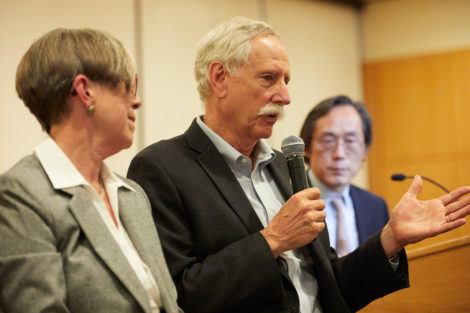October 11, 2019—Many of the federal food programs we now take for granted, such as SNAP (formerly food stamps) and the National School Lunch Program, were established or expanded after the 1969 White House Conference on Food, Nutrition, and Health. The landmark conference was organized and chaired by Jean Mayer, a professor at Harvard T.H. Chan School of Public Health who would go on to become the president of Tufts University, where he founded the School of Nutrition. This month, the two schools hosted a joint anniversary event that looked back on successes in food and nutrition policy over the past half century and ahead toward solutions for a healthier, more equitable, and more sustainable food system.
The event was held October 3 at Harvard Chan School (watch video) and October 4 at Tufts Friedman School of Nutrition Science and Policy (watch video).
During the first day’s keynote, Cathie Woteki, professor of food science and human nutrition at Iowa State University, outlined the work of the White House Conference and its lasting influence. Commissioned by President Richard Nixon and held December 2–4, 1969, in Washington, D.C., the conference brought together approximately 3,000 attendees to develop policy recommendations related to hunger, food safety, and diet and health. Of its recommendations, 1,600 were implemented, including authorization of the Supplemental Feeding Program for Women Infants and Children (WIC), and development of nutrition labeling regulations.
However, Woteki noted that the conference has an unfinished agenda. Some 200 of its recommendations were not implemented, including developing a national policy on nutrition education.
Frank Hu, chair of the Department of Nutrition and Fredrick J. Stare Professor of Nutrition and Epidemiology, called attention to how timely the panel discussion on developing food guidance for health and sustainability was, given the release earlier in the week of controversial new dietary recommendations on red meat. Hu and other panelists said that the new guidelines—which suggest that it is okay for adults to continue consuming red meat at current high levels—run counter to a large body of evidence, and that the methodology that produced them was problematic. (Read more on the School’s Nutrition Source site.)
During the panel, Walter Willett, professor of epidemiology and nutrition, also spoke about his experience as co-author of The EAT-Lancet Commission on healthy diets from sustainable food systems report, released earlier this year. The report recommended shifting toward largely plant-based diets for human and planetary health.
Dean Michelle Williams called on the audience to use the event as a step toward a vision for addressing current challenges in nutrition and health, such as obesity, disparities, and sustainability, in the spirit of the White House Conference.
This forward-looking vision was the focus of the event’s second day at Tufts, which featured panel discussions on health systems, the food environment, government feeding programs, and agriculture and sustainability.
The conference organizers plan to release a special joint report in the coming months with food and nutrition policy recommendations for 2020 and beyond.
Photo: Kent Dayton
